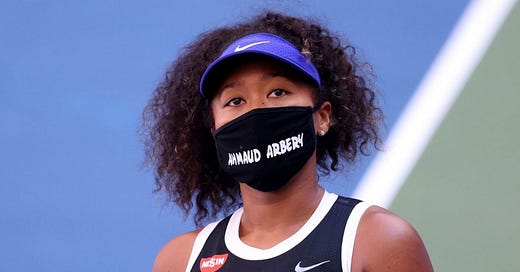Naomi Osaka Doesn’t Want to Talk
The minute that Naomi Osaka announced yesterday that she was withdrawing from this year’s French Open, the cry went out: “Roland-Garros fucked up.” Even before Osaka made the announcement, writers like Roxane Gay were saying that the French Open would regret picking a fight with one of the biggest stars in the sport. After all, this year’s tournament will be much less interesting without Osaka, and now Roland-Garros looks like they bullied a young player who was simply trying to protect her mental health.

But the French Open has been around for 130 years. It will award 34.4 euros (~$42 million) in prize money this year. As one of the four Grand Slams, it is a pillar of the international tennis community—it’s not going anywhere. Ratings might suffer slightly without Osaka, but it will survive. Even though Osaka seems like a once-in-a-generation talent, the game has other compelling players, and there are always new stars waiting to be born.
It is nice to believe that people of exceptional ability, like Osaka, can bend powerful institutions to their will, but it’s just not really true, especially in pro sports, where there are always people fighting to take your spot. Colin Kaepernick led a team to a Super Bowl, but was run out of football just a few years later for daring to protest police brutality—and the NFL simply moved on without him. Curt Flood was a Gold Glove center fielder, but when he stood up for a player’s right to control his own destiny, he was blackballed from the game—even though MLB’s reserve clause was eventually struck down, he only played 13 games, for the lowly Washington Senators, after filing his lawsuit. And this is to say nothing of all the examples outside of sports in which someone with clear ability was forced out of an industry for making powerful figures angry, with virtually no negative consequences for that industry.
Time and again capitalism teaches us that, for all its talk about valuing individuals, its powerful institutions will grind into dust those individuals that dare to become threats. So it’s not likely that the French Open will face some sort of karmic comeuppance for its treatment of Osaka. The solution to social problems lies not in exceptional individuals, but in solidarity with the great mass of oppressed people.
Which is why it is alarming when so many supposed leftists default reflexively to the position that the rules should not apply to Naomi Osaka. When she first announced her intention to skip press conferences at Roland-Garros, several people seemed to suggest that the French Open should just accept Osaka’s decision, even though the rules require the players to talk to the press after matches. The Roland-Garros statement, in which they basically just reiterated those rules and said they wouldn’t make an exception for Osaka, was loudly denounced, with people like Dave Zirin calling it “shocking.” But rules don’t just go away because prominent people don’t like them; insisting they should is a very odd version of justice. If the rule is bad, it should be changed, but “don’t enforce the rules on famous people we like” is not a particularly egalitarian view. For similar reasons, the fact that Osaka was “willing to pay the fine” should not be held up as a virtue, since we cannot have different rules for people with a spare $15,000 than for people who cannot afford to pay the fine.
Of course, the impulse to respect players’ mental health is a good one. Osaka is right that the press is often hostile to athletes, in a way that is especially hard on Black players’ mental health (in the fallout from this, an old clip of a white reporter interviewing a young Venus Williams about her confidence made the rounds on Twitter—it’s a great illustration of the way seemingly innocuous questions can reinforce racial hierarchies). Indeed, post-match press conferences usually ARE stupid and the process probably should be reformed. Osaka, with her fame and wealth and star power, is uniquely equipped to organize resistance to the rule and force a change. Indeed, her statement yesterday announcing her decision suggested that is what she hopes to do. So I do not blame Osaka at all for what she did, and I’m hopeful that this will lead to reconsideration of mental health in the tennis community, and possibly a change to the rules about press conferences.
But if, in your defense of Osaka and promotion of mental health, you find yourself arguing that talented and exceptional people should not be held to the same standards as the rest of us, then I’m afraid you have gone horribly awry. Siding with Osaka over Roland-Garros seems like you are taking the progressive side—defending a young woman of color who has been an eloquent advocate for social justice, over a staid and corrupt European institution—but it’s not a real solution. Exceptional individuals on their own cannot defeat institutions. It’s fine to like Naomi Osaka more than you like the professional sports media—it would be weird if you didn’t. But “solutions” that depend on having Osaka’s fame or wealth or unique talent are not solutions that will help everyone. They are band aids on a larger problem. Player power, and respect for athletes’ mental health, has to start at the bottom of the pyramid, not the top. Solidarity over superstars every day.



